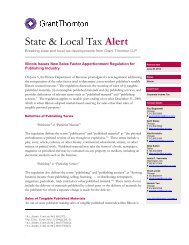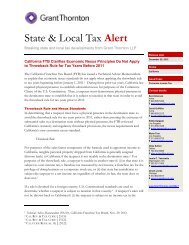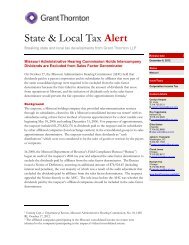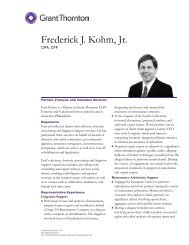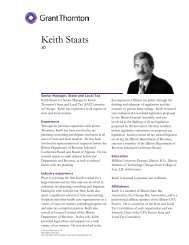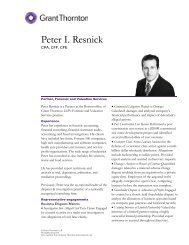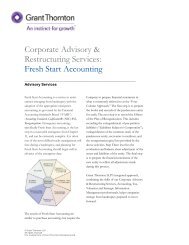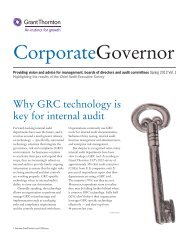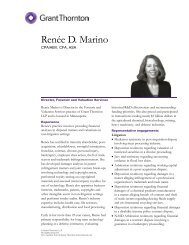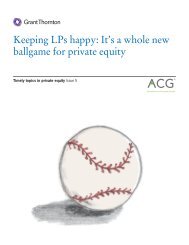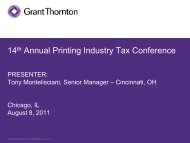State & Local Tax Alert - Grant Thornton LLP
State & Local Tax Alert - Grant Thornton LLP
State & Local Tax Alert - Grant Thornton LLP
You also want an ePaper? Increase the reach of your titles
YUMPU automatically turns print PDFs into web optimized ePapers that Google loves.
<strong>State</strong> & <strong>Local</strong> <strong>Tax</strong> <strong>Alert</strong><br />
Breaking state and local tax developments from <strong>Grant</strong> <strong>Thornton</strong> <strong>LLP</strong><br />
Release date<br />
February 18, 2011<br />
Illinois Circuit Court Holds Acceptance of Sales Orders in County<br />
Is Necessary to Impose <strong>Local</strong> Sales <strong>Tax</strong><br />
An Illinois circuit court has held that a seller that did not engage in the business of selling<br />
tangible personal property within a county cannot be subject to a home rule county’s<br />
sales tax, the Retailers’ Occupation <strong>Tax</strong> (“ROT”). 1 The seller was headquartered in a<br />
county that imposed a local sales tax, but accepted sales orders in a sales office located in<br />
a county that did not impose a local sales tax. Therefore, the seller was not subject to a<br />
local sales tax.<br />
Background<br />
The taxpayer, a family owned business headquartered in Illinois, was a supplier of diesel<br />
fuel, gasoline and bulk lube oil. While the taxpayer was headquartered in Cook County,<br />
Illinois, it maintained a separate designated sales office in Putnam County, Illinois where<br />
all sales transactions were completed. As part of its business, the taxpayer fulfilled daily<br />
purchase transactions with customers who were provided bid pricing information from<br />
its office in Cook County. Daily purchase order customers were directed to place their<br />
orders with the taxpayer’s sales representatives at its designated sales office in Putnam<br />
County. In other words, all orders for the taxpayer’s goods were received and accepted<br />
at its sales office in Putnam County.<br />
The Illinois Department of Revenue claimed that the taxpayer was subject to the local<br />
ROT in Cook County. The taxpayer argued that it should only be subject to Illinois state<br />
sales tax, as all of its sales took place in Putnam County, which has no applicable local<br />
sales taxes. The court ruled in favor of the taxpayer.<br />
Home Rule County Retailers’ Occupation <strong>Tax</strong><br />
An Illinois regulation provides that any county which is a home rule unit is authorized to<br />
impose a local ROT on all persons engaged in the business of selling tangible personal<br />
property in the county, on the gross receipts from sales made in the course of such<br />
business. 2 In order for a seller to incur tax liability under the local ROT, a sale must be<br />
made in the course of the seller’s engaging in retail business within that county. A<br />
regulation provides that “enough of the selling activity must occur within the home rule<br />
county to justify concluding that the seller is engaged in business within the home rule<br />
<strong>State</strong>s<br />
Illinois<br />
Issue/Topic<br />
Sales and Use <strong>Tax</strong><br />
Contact details<br />
Alex Laskowski<br />
Chicago<br />
T 312.602.9004<br />
E alex.laskowski@us.gt.com<br />
Mike D’Addio<br />
Chicago<br />
T 312.602.8985<br />
E mike.d’addio@us.gt.com<br />
Paul Bogdanski<br />
Chicago<br />
T 312.602.8269<br />
E paul.bogdanski@us.gt.com<br />
Giles Sutton<br />
Charlotte<br />
T 704.632.6885<br />
E giles.sutton@us.gt.com<br />
Jamie Yesnowitz<br />
Washington, DC<br />
T 202.521.1504<br />
E jamie.yesnowitz@us.gt.com<br />
Chuck Jones<br />
Chicago<br />
T 312.602.8517<br />
E chuck.jones@us.gt.com<br />
Angela McNeany<br />
Chicago<br />
T 312.602.8174<br />
E angela.mcneany@us.gt.com<br />
www.<strong>Grant</strong><strong>Thornton</strong>.com/SALT<br />
1 Hartney Fuel Oil Co. v. Department of Revenue, Tenth Circuit Court of Illinois, Nos. 08-MR-11, 08-<br />
MR-13, 08-MR-15, Jan. 26, 2011.<br />
2 ILL. ADMIN. CODE tit. 86 § 220.101(a).
<strong>Grant</strong> <strong>Thornton</strong> <strong>LLP</strong> - 2<br />
county with respect to that sale.” 3<br />
Required Level of Selling Activity<br />
As provided in the regulations, a seller will be subject to the local ROT if the seller is<br />
engaged in the business of selling in that county. In determining if a seller is “engaged in<br />
the business of selling,” a regulation provides that a seller’s acceptance of a purchase order<br />
or other actions in making a sales contract is “the most important single factor in the<br />
occupation of selling.” 4 In other words, the “business of selling” occurs when orders are<br />
being accepted. Therefore, if an order is accepted at a seller’s place of business within the<br />
county, it will be subject to the local ROT. It is important to note that a rebuttable<br />
presumption exists in which the Department will assume that the seller has accepted the<br />
purchase order at the place of business in which the order is received. 5<br />
In the case of the taxpayer, who accepted all of its daily purchase orders at its designated<br />
sales office in Putnam County, the fact that the pricing bids were faxed to customers from<br />
its office located in Cook County did not constitute enough selling activity to support<br />
taxation in that location. As noted in the regulation, “mere solicitation of orders” does<br />
not constitute doing business. 6<br />
As applied to long-term purchase contracts, a regulation provides that the sales tax situs of<br />
deliveries made under long-term contracts is deemed to be within the home rule county<br />
only if the contract “must be implemented by the purchaser’s placing of specific orders<br />
when goods are wanted.” 7 In the case of the taxpayer, its long-term purchase contracts<br />
did not require the placing of orders when goods were wanted. Instead, the customers’<br />
needs under the long term-contracts were determined and fulfilled by a common carrier<br />
making delivery when goods were needed in order to maintain customer-determined fuel<br />
inventory levels, without an actual order being placed by the customer.<br />
In situations where sales are made pursuant to long-term contracts under which the<br />
purchaser is not required to place specific orders, the sales tax situs is deemed to revert to<br />
the place of acceptance of the contract. Again, in the case of the taxpayer, no specific<br />
orders were being placed in accordance with the long-term contracts and all master<br />
contracts were accepted at the taxpayer’s sales office in Putnam County. The court,<br />
therefore, deemed Putnam County to be the sales tax situs.<br />
3 ILL. ADMIN. CODE tit. 86 § 220.115(b)(1).<br />
4 ILL. ADMIN. CODE tit. 86 § 220.115(c)(1).<br />
5 Id.<br />
6 See ILL. ADMIN. CODE tit. 86 § 220.115(b)(2) (“For example, the Supreme Court has held that<br />
mere solicitation and receipt of orders within a taxing jurisdiction, where the orders were subject to<br />
acceptance outside the taxing jurisdiction and title passed outside the taxing jurisdiction, with the<br />
goods being shipped from outside the jurisdiction to the purchaser in the jurisdiction, did not<br />
constitute engaging in the business of selling within the jurisdiction.”). The regulation cites to the<br />
standard used for purposes of determining whether a corporation is subject to the income tax of a<br />
particular state under Public Law No. 86-272.<br />
7 ILL. ADMIN. CODE tit. 86 § 220.115(e).
<strong>Grant</strong> <strong>Thornton</strong> <strong>LLP</strong> - 3<br />
The court here found that the audit process was flawed, incomplete, factually<br />
unsupported, and legally in error. The court pointed out that the auditor misstated the<br />
focus of the analysis that is required under the regulations. The regulatory standards were<br />
not applied to the home rule taxing venue, but instead, the audit focused on whether<br />
enough selling activity occurred in Putnam County. The main issue in the regulations is<br />
whether the Department can support the determination that there is “enough selling<br />
activity” in the home rule municipality, Cook County, to enforce the home rule taxation.<br />
As previously stated, the court found that there was not enough selling activity in the<br />
home rule municipality to enforce taxation in Cook County.<br />
Commentary<br />
The Illinois circuit court’s decision is important for retailers who maintain offices in more<br />
than one county. As was the case with the taxpayer, most retailers prefer to conduct<br />
business in a county with a comparatively low sales tax rate, with all other things being<br />
equal. In order to enhance the small profit margin associated with the type of business the<br />
taxpayer engaged in, the taxpayer changed its sales operation locations several times<br />
looking for a situs that would be competitively advantageous for sales tax purposes. In<br />
order to take advantage of the favorable sales tax rate in one county, it is imperative that a<br />
retailer maintain a dedicated sales facility and have that facility solely accept sales orders.<br />
As evidenced by this decision, if the taxpayer had accepted any orders at its office in Cook<br />
County, it would have been considered to be engaging in the business of selling and would<br />
be subject to the local ROT on its gross receipts. The taxpayer clearly had to carefully<br />
ensure that it did not accept any orders in Cook County in order to obtain this result.<br />
Based on the language used by the court, it will be interesting to see whether the<br />
Department will appeal this decision. The court continually pointed out, in uncommonly<br />
strong terms, that the audit process was flawed and premised on incomplete, factually<br />
wrong, and legally misunderstood findings. If the audit had been properly conducted, the<br />
Department likely would have favored the taxpayer’s continued and previously condoned<br />
practice of operating a separate, dedicated sales office in a tax venue of its choice.<br />
The information contained herein is general in nature and based on authorities that are subject to change.<br />
It is not intended and should not be construed as legal, accounting or tax advice or opinion provided by<br />
<strong>Grant</strong> <strong>Thornton</strong> <strong>LLP</strong> to the reader. This material may not be applicable to or suitable for specific<br />
circumstances or needs and may require consideration of nontax and other tax factors. Contact <strong>Grant</strong><br />
<strong>Thornton</strong> <strong>LLP</strong> or other tax professionals prior to taking any action based upon this information. <strong>Grant</strong><br />
<strong>Thornton</strong> <strong>LLP</strong> assumes no obligation to inform the reader of any changes in tax laws or other factors that<br />
could affect information contained herein. No part of this document may be reproduced, retransmitted or<br />
otherwise redistributed in any form or by any means, electronic or mechanical, including by photocopying,<br />
facsimile transmission, recording, re-keying or using any information storage and retrieval system without<br />
written permission from <strong>Grant</strong> <strong>Thornton</strong> <strong>LLP</strong>.
<strong>Grant</strong> <strong>Thornton</strong> <strong>LLP</strong> - 4<br />
<strong>Tax</strong> professional standards statement<br />
This document supports the marketing of professional services by <strong>Grant</strong> <strong>Thornton</strong> <strong>LLP</strong>. It is<br />
not written tax advice directed at the particular facts and circumstances of any person. Persons<br />
interested in the subject of this document should contact <strong>Grant</strong> <strong>Thornton</strong> or their tax advisor<br />
to discuss the potential application of this subject matter to their particular facts and<br />
circumstances. Nothing herein shall be construed as imposing a limitation on any person from<br />
disclosing the tax treatment or tax structure of any matter addressed. To the extent this<br />
document may be considered written tax advice, in accordance with applicable professional<br />
regulations, unless expressly stated otherwise, any written advice contained in, forwarded with,<br />
or attached to this document is not intended or written by <strong>Grant</strong> <strong>Thornton</strong> <strong>LLP</strong> to be used,<br />
and cannot be used, by any person for the purpose of avoiding any penalties that may be<br />
imposed under the Internal Revenue Code.




